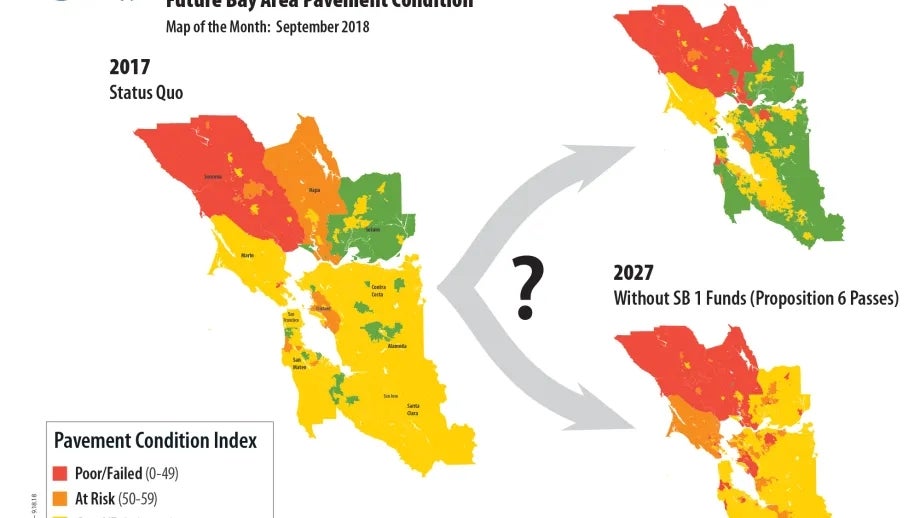Report to the Commission and the ABAG Executive Board: September 26, 2018
BSA Audit of Seismic Program
August 28, Sacramento
The Bureau of State Audits (BSA) has completed its third legislatively-directed audit of the Toll Bridge Seismic Retrofit Program. The earlier two audits were conducted when the program was beset by repetitive cost overruns and schedule delays. This latest analysis covered the period after the Toll Bridge Program Oversight Committee (TBPOC) was created by AB 144 in 2005. Among the key conclusions:
- The comprehensive risk management program implemented for the seismic program ultimately avoided more than $455 million in potential costs and seven years of potential delays.
- Expenses related to the repair or replacement of components accounted for a small portion of the Bay Bridge project’s overall cost.
- Although the seismic program will end roughly on budget in 2019, borrowing and maintenance costs are significant and will continue for decades.
CEDS Approved
September 7, Seattle
In a major step toward becoming an Economic Development District, ABAG President David Rabbitt received approval of the region’s Comprehensive Economic Development Strategy (CEDS) from the Seattle regional office of the U.S. Economic Development Administration. Congratulations to Cynthia Kroll and her team on achieving this important milestone.
Clipper Executive Board
September 10, San Carlos
In another major milestone – this one for the Clipper transit smart card program administered by MTC – the advisory board of the major transit operators voted unanimously to recommend that MTC award the new contract for developing Clipper 2.0 to Cubic Transportation Systems, the current system contractor. This recommendation is before the Commission for approval at its September meeting.
Diesel Free by ’33 Event
September 12, San Francisco
The Bay Area Air Quality Management District hosted a day-long event in conjunction with Governor Brown’s Global Climate Summit. The centerpiece of the Air District event was a signing ceremony for elected leaders from throughout the region to pledge to be Diesel Free by 2033. MTC Chair Jake Mackenzie and several other MTC and ABAG board members participated in panel discussions throughout the day. Oh, and one more thing: the morning keynoter was Steve Kerr, coach of your NBA Champion Golden State Warriors.
CASA Technical Committee
September 19, San Francisco
The CASA Technical Committee had an information-packed agenda this week, with three presentations on (1) a menu of new housing revenue options, (2) an outline of what a new Regional Housing Trust Fund might look like, and (3) a summary of 16 policy changes that could facilitate the protection, preservation and production of housing at all in same levels. [PowerPoint presentations] The CASA Steering Committee will receive a similar set of presentations at its meeting on September 26th.
MPO Leadership Changes
In a game of musical chairs, Hasan Ikhrata, the former executive director of the Southern California Association of Governments (SCAG), has been appointed to lead the San Diego Association of Governments. That means, of course, that SCAG will be looking for a new executive director – just like MTC. The Southern California transition will occur on December 1st.
Factoid of the Month
Here’s the latest update on our structural imbalance between job creation and housing construction: from 2010 to 2017, the Bay Area created 722,000 jobs and only 106,000 housing units. CASA, the region turns its lonely eyes to you.
This month’s map illustrates the impact on local pavement condition that could result from the passage or failure of Proposition 6, a statewide measure that has been submitted to California voters for consideration on November 6th 2018. This trio of maps focuses on Pavement Condition Index (PCI), a metric used in determining the structural quality of existing roadway surfaces. The index ranges from 0 to 100, with 0 representing a failed road and 100 representing a brand-new facility. Currently in the nine-county Bay Area region, the 109 jurisdictions (including unincorporated parts of the counties) have an average PCI score of 67, which corresponds to a Fair condition. Should Proposition 6 pass, the Bay Area’s average PCI score would fall to 57, which is “At risk” of failure. If Proposition 6 fails, SB 1 funds will remain intact thus providing dedicated funding to address significant deferred maintenance in the region’s local road network and hold the average PCI score steady at 66 in 2027.

